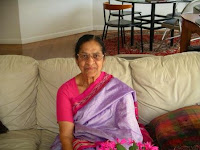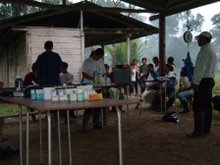
my Grandma:
one of the smartest people I know!
I recently went back to my hometown for a visit and realized that some of my dearest friends and family do not have access to the internet. This may seem obvious and acceptable, but to me it is neither.
Who are these people in my life who are so archaic they don't have internet access even though they can afford it? Well, 1) my grandma and 2) dear family friends who are not-so-recent migrants.
I was studying at my aunt's house the other day when I decided to see what my grandmother thinks of YouTube.com. (This post is supposed to be about health outcomes...we'll get there). I typed in 'Andhra Pradesh' (our home state in India) into the search bar, and six pages worth of videos came up. We watched a few videos on Indian freedom fighters during the time of Gandhi. My grandma was a little girl during India's freedom fight--she recalls witnessing her elder brother being beaten by British-hired Indian law enforcement officers for his revolutionary activities. The videos, which were even narrated in her native Telugu, brought back all sorts of memories for her. She even talked about writing a book about her brother's role in the fight for Indian independence. She was jazzed.
My aforementioned migrant friends could benefit from internet access too. Some of them don't speak English at all. They make enough money to afford a computer and the internet, so the barriers are not financial. They just don't have the freedom to do things like take time off from work to do something frivolous like educate themselves. But there is a crucial point to make here--just as we discussed in the first weeks of class, and just as UK & Netherlands authors Wagstaff and Van Doorslaer (gold standard researchers on poverty and health) point out, the effects (i.e. the cost) of not having things like the internet are much more significant for disadvantaged people. In other words, it would mean a great deal more to my grandma, or to my migrant friends, to have internet access, than it means for someone like me to have it.
What would it mean? The possibilities are endless. For my grandma, maybe it means delayed onset of dementia. Less depression, anxiety and social isolation (she can connect with others and entertain herself as she gets older and cannot move around as much). Fewer medical episodes. For migrants, it also means access to empowering information that may well give them the freedom to see education as a basic right/need rather than a peripheral idea. It would mean access to services that they would otherwise have no way of knowing exist. Faced with all this new technology, it seems that education is more important than ever. Increasing access and utilization are key.
I spent some time teaching my grandma how to use my aunt's PC. She's a quick and eager learner in her mid-80's. Her biggest challenges were learning how to operate the mouse and focusing her eyes on the screen. I wonder why the local senior citizen center offers arts and crafts, but not computer classes? There's so much human potential out there, sometimes in the most surprising places. From that perspective, the field of public health would do something incredible if it focused on ways to give people the tools they need to live productive lives. Because for many (if not most) people, feeling productive = feeling truly happy.





5 comments:
That was a beautiful post, farah. I wish I could go back to Iran and have the same experience with my grandma. I guess what the key would be is people making computers that are easy to use by all facets of society. Meaning things like voice recognition, or other forms of innovative user interfaces that will overcome some of the barriers of for instance using a mouse, or typing on a keyboard for people unafamiliar with the technology.
Hmm well I don't actually have to skip generations to find people who don't have internet access in my family--my dad doesn't have internet access in sun shiny Singapore even though it is readily available. He just never learnt to use computers, but i guess after reading your post, I should really teach him if i do head back to Singapore this summer. thanks for this nice post!
That was so amazing that you spent time teaching your grandmother about the internet and especially youtube. I recently showed my mom that and she got a kick as well.
Thank you for a great post. Its one thing to discuss these issues in class but another to observe them within the context of your own world view. It's great that you helped your grandmother navigate a computer (and the internet).
I loved your post! The way you show us with a personal example the potential health benefit of interventions like this is just perfect for me.
Thank you!
Marina
Post a Comment